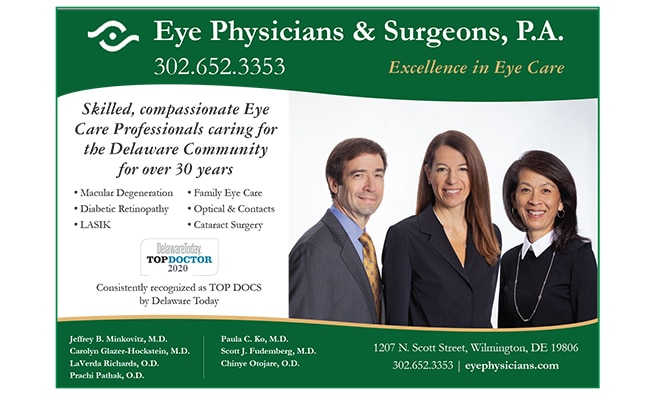The Importance Of Preventive Eye Care

By Jeffrey B. Minkovitz, M.D.
Of all the human senses, vision is often named as the most important and precious – that which would be missed most if lost. According to the CDC, approximately 11 million Americans over the age of 12 could improve their vision through proper refractive correction, and over 3 million (3%) over 40 are either legally blind or have low vision. People often seek eye care if their eyes are red or painful, or if vision becomes blurry. But routine eye examinations are important even if eyes and vision are fine – because many blinding eye diseases have few or no warning signs until vision loss is severe and possibly irreversible.
The most common cause of blindness in the United States is diabetic eye disease. In the early stages, when most easily treated, diabetic eye disease has no symptoms. Diabetics should have a comprehensive, dilated eye examination at least once a year to prevent serious complications. Maintaining good blood sugar control is also important to the health of the eyes.
The second most common cause of blindness in the U.S. is glaucoma. Vision loss from glaucoma often goes undetected until the disease is advanced, and once vision is lost, it can never be regained. Also, progression of more advanced glaucoma is more difficult to arrest. Glaucoma is more common in older adults, but it can occur even in the young. Regular examinations include screening to detect glaucoma.
The most common cause of blindness among Americans over age 50 is age-related macular degeneration. While early macular degeneration has no cure, early detection, vitamins and a healthy diet can help to avoid progression. In cases which do progress, prompt intervention can improve outcomes.
Worldwide, cataracts are by far the most common cause of blindness. Fortunately, this condition is reversible, and treatment is widely available in developed countries. Technical advances have made surgery more successful than ever before.
The American Academy of Ophthalmology has revised its recommendations for routine eye examinations, stating children should have routine screening and vision testing during regular pediatric visits, with referral to a specialist in the event of a finding or a family history or other risk factor. Young adults should have a baseline evaluation, and then periodic routine visits. “The frequency of ocular examinations should depend on the individual’s age, race, past ocular history, medical history, family history of eye disease, and the types of symptoms or ocular findings encountered.” Your eye care professional should recommend an appropriate interval.
In addition to periodic screening examinations, prevention is important for maintaining good ocular health. Always wear eye protection when working with power tools or dangerous chemicals, or when playing sports posing a risk of eye injury. Fireworks and paintball injuries are also common causes of vision loss. Ultraviolet protection (glasses or sunglasses) can help to prevent cataracts, macular degeneration and ocular tumors. A diet healthy in fish and green vegetables can reduce the risk of macular degeneration. Finally, good blood pressure and blood sugar control, and smoking cessation helps avoid eye disease in addition to other health benefits.
While great advances have been made in ophthalmic treatments including cataract surgery and macular degeneration therapy, prevention and early detection can help to ensure the best possible vision for a lifetime.
Bio
Jeffrey Minkovitz, MD is an ophthalmologist with Eye Physicians and Surgeons in Wilmington, specializing in cataract surgery, laser vision correction, and corneal diseases. He trained at Harvard, University of Massachusetts, Washington University, and Johns Hopkins’ Wilmer Eye Institute. He participated in the early research on PRK laser vision correction which led to FDA approval in 1994, performed the first Delaware laser treatment in 1995, and has since performed thousands of eye surgeries. Recognized for several Delaware “firsts,” in addition to laser vision correction, Dr Minkovitz introduced near vision CK (to reduce the need for reading glasses), DSAEK, DMEK and DALK (less invasive methods of corneal transplantation), and laser assisted cataract surgery. Dr Minkovitz is on staff at Christiana Care, and is co-founder of the Center for Advanced Surgical Arts, where he serves on the medical advisory board. In 2016, he founded Laser Vison Delaware, the First State’s newest laser vision correction center with the latest advanced technology. Dr Minkovitz has been a speaker at the annual meeting of the American Academy of Ophthalmology, and received the Outstanding Teaching Award from residents at Wilmer Eye Institute. He has been voted by his peers a Top Doc in Ophthalmology in Delaware Today Magazine for more than 8 years, most recently in 2019. In 2022 Dr Minkovitz completed his Health Care MBA at Johns Hopkins Carey Business School, intending to apply his clinical and ophthalmic knowledge to advancing health care through innovation.
Visit us on facebook or at www.eyephysicians.com
For further information or to schedule an appointment please call 302-656-2020 extension 1.


